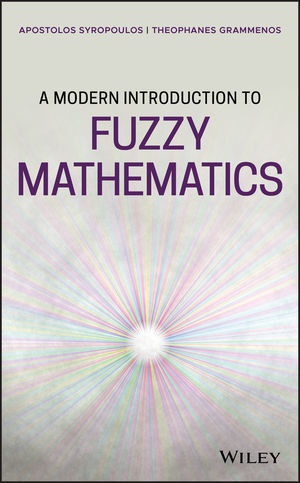Read more
Provides readers with the foundations of fuzzy mathematics as well as more advanced topics
A Modern Introduction to Fuzzy Mathematics provides a concise presentation of fuzzy mathematics., moving from proofs of important results to more advanced topics, like fuzzy algebras, fuzzy graph theory, and fuzzy topologies.
The authors take the reader through the development of the field of fuzzy mathematics, starting with the publication in 1965 of Lotfi Asker Zadeh's seminal paper, Fuzzy Sets.
The book begins with the basics of fuzzy mathematics before moving on to more complex topics, including:
* Fuzzy sets
* Fuzzy numbers
* Fuzzy relations
* Possibility theory
* Fuzzy abstract algebra
* And more
Perfect for advanced undergraduate students, graduate students, and researchers with an interest in the field of fuzzy mathematics, A Modern Introduction to Fuzzy Mathematics walks through both foundational concepts and cutting-edge, new mathematics in the field.
List of contents
Preface V
Chapter 1 Introduction 1
1.1 What is vagueness? 1
1.2 Vagueness, Ambiguity, Uncertainty,... 4
1.3 Vagueness and Fuzzy Mathematics 5
Chapter 2 Fuzzy Sets and Their Operations 9
2.1 Algebras of Truth Values 9
2.1.1 Posets 9
2.1.2 Lattices 11
2.1.3 Frames 11
2.2 Zadeh's Fuzzy Sets 12
2.3 alpha-cuts of Fuzzy Sets 16
2.4 Interval Valued and Type 2 Fuzzy Sets 19
2.5 Triangular Norms and Conorms 21
2.6 L-fuzzy Sets 23
2.7 "Intuitionistic" Fuzzy Sets and Their Extensions 24
2.8 The Extension Principle 28
2.9* Boolean-Valued Sets 30
2.10* Axiomatic Fuzzy Set Theory 32
Chapter 3 Fuzzy Numbers and Their Arithmetic 35
3.1 Fuzzy Numbers 35
3.1.1 Triangular Fuzzy Numbers 36
3.1.2 Trapezoidal Fuzzy Numbers 37
3.1.3 Gaussian Fuzzy Numbers 37
3.1.4 Quadratic Fuzzy Numbers 39
3.1.5 Exponential Fuzzy Numbers 41
3.1.6 LR Fuzzy Numbers 41
3.1.7 Generalized Fuzzy Numbers 42
3.2 Arithmetic of Fuzzy Numbers 43
3.2.1 Interval Arithmetic 43
3.2.2 Interval Arithmetic and alpha-Cuts 43
3.2.3 Fuzzy Arithmetic and the Extension Principle 44
3.2.4 Fuzzy Arithmetic of Triangular Fuzzy Numbers 45
3.2.5 Fuzzy Arithmetic of Generalized Fuzzy Numbers 45
3.2.6 Comparing Fuzzy Numbers 47
3.3 Linguistic Variables 49
3.4 Fuzzy Equations 50
3.4.1 Solving the Fuzzy Equation A s X + B = C 50
3.4.2 Solving the Fuzzy Equation A s X² + B s X + C = D 53
3.5 Fuzzy Inequalities 55
3.6 Constructing Fuzzy Numbers 55
3.7 Applications of Fuzzy Numbers 57
3.7.1 Simulation of the Human Glucose Metabolism 57
3.7.2 Estimation of an Ongoing Project's Completion Time 60
Chapter 4 Fuzzy Relations 65
4.1 Crisp Relations 65
4.2 Fuzzy Relations 69
4.3 Cartesian Product, Projections, and Cylindrical Extension 70
4.4 New Fuzzy Relations From Old Ones 72
4.5 Fuzzy Binary Relations on a Set 75
4.6 Fuzzy Orders 80
4.7 Elements of Fuzzy Graph Theory 82
4.7.1 Graphs and Hypergraphs 82
4.7.2 Fuzzy Graphs 83
4.7.3 Fuzzy Hypergraphs 87
4.8* Fuzzy Category Theory 89
4.9* Fuzzy Vectors 96
4.10 Applications 97
Chapter 5 Possibility Theory 101
5.1 Fuzzy Restrictions and Possibility Theory 101
5.2 Possibility and Necessity Measures 103
5.3 Possibility Theory 105
5.4 Possibility Theory and Probability Theory 108
5.5 An Unexpected Application of Possibility Theory 110
Chapter 6 Fuzzy Statistics 117
6.1 Random Variables 117
6.2 Fuzzy Random Variables 120
6.3 Point Estimation 123
6.3.1 The unbiased estimator 124
6.3.2 The consistent estimator 125
6.3.3 The maximum likelihood estimator 126
6.4 Fuzzy Point Estimation 127
6.5 Interval Estimation 128
6.6 Interval Estimation for Fuzzy Data 129
6.7 Hypothesis Testing 131
6.8 Fuzzy Hypothesis Testing 132
6.9 Statistical Regression 134
6.10 Fuzzy Regression 136
Chapter 7 Fuzzy Logics 141
7.1 Mathematical Logic 141
7.2 Many-Valued Logics 146
7.3 On Fuzzy Logics 151
7.4 Hájek's Basic Many-Valued Logic 152
7.5 Aukasiewicz Fuzzy Logic 155
7.6 Product Fuzzy Logic 157
7.7 Gödel
About the author
APOSTOLOS SYROPOULOS, PHD, is an independent scholar based in Xanthi, Greece. His research interests include fuzzy mathematics, the philosophy of vagueness, computability theory, category theory, and digital typography. He has authored or co-authored more than 10 books and more than 60 papers and articles. He has served in the program committee of numerous scientific conferences and has reviewed papers for many journals.
THEOPHANES GRAMMENOS, PHD, is Assistant Professor of Applied Mathematics in the Department of Civil Engineering, University of Thessaly, Greece. He received his PhD from University of Athens, Greece. Dr. Grammenos is a member of the editorial board for Applied Mathematics and the International Journal of Applied Mathematical Research.
Summary
Provides readers with the foundations of fuzzy mathematics as well as more advanced topics
A Modern Introduction to Fuzzy Mathematics provides a concise presentation of fuzzy mathematics., moving from proofs of important results to more advanced topics, like fuzzy algebras, fuzzy graph theory, and fuzzy topologies.
The authors take the reader through the development of the field of fuzzy mathematics, starting with the publication in 1965 of Lotfi Asker Zadeh's seminal paper, Fuzzy Sets.
The book begins with the basics of fuzzy mathematics before moving on to more complex topics, including:
* Fuzzy sets
* Fuzzy numbers
* Fuzzy relations
* Possibility theory
* Fuzzy abstract algebra
* And more
Perfect for advanced undergraduate students, graduate students, and researchers with an interest in the field of fuzzy mathematics, A Modern Introduction to Fuzzy Mathematics walks through both foundational concepts and cutting-edge, new mathematics in the field.

